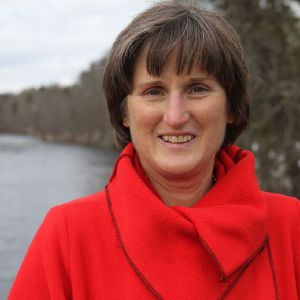‘Frivolous and lacking merit’: Complaint against golf committee members over clubhouse vote dismissed

Golfers at the driving range at Beaver Meadow Golf Course on a rainy afternoon in April. Catherine McLaughlin—Monitor staff
|
Published: 04-22-2025 1:33 PM
Modified: 04-22-2025 7:01 PM |
The city of Concord should want people with relevant experience to give advice about pressing issues — that’s how Steve Shurtleff sees it.
That means it should want golfers on the golf committee.
“As a former Speaker of the House, whenever putting people on committees, I would always look to those that had the qualifications and some expertise in the matter that the committee was taking up,” Shurtleff said.
Concord’s Board of Ethics voted unanimously to dismiss a complaint from resident Marcy Charette that took issue with the membership of the city’s Golf Course Advisory Committee being almost entirely Beaver Meadow members, especially when city rules set aside positions for “General Public” representatives separate from those for course users. Charette viewed course membership as a conflict of interest when it came to the issue of the city’s plan to tear down the old clubhouse and build a new one at taxpayers’ expense. Shurtleff, a longtime former state representative and city councilor, sits on the ethics board and presided as chair over this matter.
The heart of Charette’s complaint is tied to the proposal for a new, $8 million clubhouse at the city-owned golf course. She, and others who have written the city council about her complaint, object to a project they see as serving an elite few at the expense of the many. Moreover, Charette sees city leaders doing everything they can to justify the price tag of new construction — including endorsements from committee members who, as course users, may be naturally inclined to see value in a new clubhouse.
The ethics board dismissed the complaint without holding a hearing, finding that it “on its face is frivolous and otherwise lacks merit,” per the meeting minutes.
The Golf Course Advisory Committee was one of three groups that made a recommendation for City Councilors to move ahead with a new clubhouse at Beaver Meadow over other less costly options, including a roughly $5 million renovation of the current facility. In May, councilors will decide whether or not to move forward on it this year under the umbrella of lengthy city budget deliberations.
Charette said Monday she wasn’t surprised the complaint was dismissed.
Article continues after...
Yesterday's Most Read Articles
 Skeletal remains across from state prison identified as Concord fugitive
Skeletal remains across from state prison identified as Concord fugitive
 Man dies in RV fire in parking lot of Concord’s Steeplegate Mall
Man dies in RV fire in parking lot of Concord’s Steeplegate Mall
 25-year-old Concord man identified as Steeplegate Mall RV fire victim
25-year-old Concord man identified as Steeplegate Mall RV fire victim
 ‘Field of Dreams’ to ‘a dump’ – What golfers have to say about Concord’s plans to rebuild the Beaver Meadow clubhouse
‘Field of Dreams’ to ‘a dump’ – What golfers have to say about Concord’s plans to rebuild the Beaver Meadow clubhouse
 ‘New Hampshire is just going to embarrass itself’: Former Child Advocate warns against proposed office cuts
‘New Hampshire is just going to embarrass itself’: Former Child Advocate warns against proposed office cuts
 N.H. mulls immigration bill to ban sanctuary policies and overrule local control
N.H. mulls immigration bill to ban sanctuary policies and overrule local control
“You could blame anyone: you could blame the mayor for nominating them, you could blame them for accepting it, you could blame whoever wrote a confusing ordinance,” Charette said. “The fact is they’re not giving the people of Concord the say over their government that they deserve to have.”
While Shurtleff described Charette’s concerns as thorough, genuine and thoughtful, he and his peers didn’t think they qualified as a violation of city ethics rules: the committee members get no material benefit to their positions and whether or not people qualify to serve on a committee is really up to the city councilors who put them there, he said.
“I didn’t feel that anyone that was appointed to the committee was acting in any way that they shouldn’t,” he said. “The fact that they were golfers, I don’t think that tarnished their representation.”
In response to her complaint, members of the golf advisory committee rejected the idea that they could not speak for the interests of city residents broadly just because they play golf. Those who are course members — which was not in fact everyone named in the complaint — noted that they disclosed this when they were nominated and were confirmed by city councilors.
Shurtleff and the ethics board put an emphasis on the latter point.
Ethics board member Tenley Callaghan disputed Charette’s interpretation that a “general public” member should be interpreted to mean a non-golfer, according to the minutes, and noted that “ultimately, City Council invited them to be on the committee.”
The ordinance doesn’t explicitly define what constitutes a voice for the general public: If anyone wants the role to be more explicitly defined, Shurtleff said, it’s something they should bring to City Council.
The committee members were just doing what was asked of them, he added, by reviewing the designs and making a recommendation for their preferred option.
Catherine McLaughlin can be reached at cmclaughlin@cmonitor.com. You can subscribe to her Concord newsletter The City Beat at concordmonitor.com.







 Photos: Signs of spring
Photos: Signs of spring Concord streets to close for Rock’N Race
Concord streets to close for Rock’N Race
